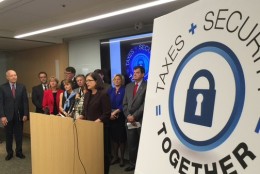
Federation of Tax Administrators sz PUBLIC must be vigilant #IDtheft #TaxesSecurityTogether #WTOP pic.twitter.com/38nqsqiTab
— Kristi King (@kingWTOP) November 19, 2015Phishing phone calls PRETEND to be IRS saying you owe $$ #IDtheft #TaxesSecurityTogether #WTOP pic.twitter.com/kfnUNzUSPG
— Kristi King (@kingWTOP) November 19, 2015
IRS head sz: Holiday shoppers need to protect personal/financial data #IDtheft #TaxesSecurityTogether #WTOP pic.twitter.com/BDooJJ9myF
— Kristi King (@kingWTOP) November 19, 2015Stranger Danger: Attachments fr unknown emails #IDtheft #TaxesSecurityTogether #WTOP pic.twitter.com/axEQdljWMp
— Kristi King (@kingWTOP) November 19, 2015
WASHINGTON — Some people are lousy at protecting their personal and financial information. That’s why a coalition of state, federal and tax industry leaders is urging the public to do more to fight identity theft.
“There’s nothing more anxiety producing for a taxpayer than to file a return and find out somebody else has filed with their information before them,” says Internal Revenue Service Commissioner John Koskinen.
Criminals are evolving and becoming incredibly sophisticated collecting what Koskinen calls “unimaginable amounts of personal data” through phone call solicitations, emails and online.
The goal of the “Taxes-Security-Together” campaign — announced at a news conference in D.C. on Thursday — is to make consumers more aware of the best ways to avoid fraud.
One recommendation: Never return phone calls or respond to emails that ask for personal information.
“When you see one pretending to be your bank, pretending to be your tax service provider, pretending to be your government, asking you to respond and give them personal information, that’s your first clue something’s not right,” says Bernie McKay, Intuit’s Vice President of Global Corporate Affairs.
Experts say phone calls threatening some sort of legal action or requesting personal information are never legitimate.
“The government doesn’t do it and neither does the private sector,” McKay says.
Just being out in public can make your information vulnerable.
“Don’t let people look over your shoulder as you’re keying information into a pad at the retailer or into your phone,” says Virginia Department of Taxation Commissioner Craig Burns. “I don’t like to get a text on my phone that says, ‘were you doing some shopping in California on your credit card?’ It’s like, no!”
Other fraud fighting tips include:
- Update virus/malware protection frequently.
- Use strong individual passwords for all accounts.
- Check out companies to know who you’re dealing with.
- Don’t open attachments in emails from unfamiliar accounts.
- Go directly to websites of businesses versus clicking email links.
- Use the auto-lock feature on tablets and smartphones.
“My phone locks after ten seconds of non-activity,” Burns says.
And as tempting as it is to share life experiences on social media, that too can make consumers vulnerable.
Posting a birth date, birth place, phone number and address can prove useful to sophisticated crooks collecting data from myriad sources.
“We’re increasingly dealing with organized crime syndicates around the world,” Koskinen says. “We need the public’s help.”








